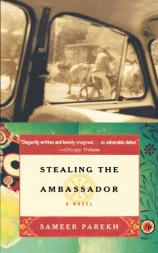Reading Group Guide
Discussion Questions
Stealing the Ambassador

1. Discuss the significance of the William Kennedy quote at the beginning of Stealing the Ambassador. Why do you think Parekh chose it to frame this story? What do you think "I liked all their lies best, for I think they are the brightest part of anybody's history" refers to?
2. Look at the opening prologue that begins, "There's an old story in my family...." Consider it in light of the entire book. Examine how the author manages to distill the essence of the entire book into a few pages. How does the opening set up your expectations as a reader? Do you think the narrator "became a thief for the cause, for the story"? Why?
3. The narrator's father's name appears for the first time on page 34, and the narrator's much later. What are some of the reasons that the author keeps the character's names out of the text for many pages? How does this affect the reader? What does it do to the story as a whole?
4. Were you surprised that Rajiv's mother had been lied to about her medical school entrance exam (page 25)? What is your reaction to her father's lying about it? Explore the cultural implications of this lie, and the significance of her Indian-born American husband being incensed by the whole situation. Look at page 39, when the narrator says of her mother that "she couldn't be a doctor, she understood that her marks weren't good enough." Considering the impact of the choices we make (or those that are made for us) in life, how did the father's lie affect her life?
5. How does Parekh's use of English and the family's native Indian dialect affect your perception of the characters? How does it affect your sense of place and time and society? How does the phrasing and placement of certain Indian words flesh out the characters?
6. Look at the Grandfather's story on page 60 that begins, "Listen." Why did the author place it at this point in the book? What is the story's importance?
7. Examine the letters from the narrator's father that end each chapter. How do these color the book's narrative? What do they reveal about the immigrant struggle to balance - and reconcile - the new life with the old?
8. What was your first impression of the narrator's attraction to the young Vasant in the airport? Looking at the narrator's interpretation of reincarnation on page 217, do you believe that the young Vasant really is the narrator's father? Are there any other reasons, besides reincarnation, that Rajiv thought Vasant was his father? How does his belief in reincarnation affect Rajiv's life? What are your feelings about it in your own life?
9. Parekh shifts back and forth in time and place throughout Stealing the Ambassador. Look at a couple of places where this happens and, keeping voice and language in mind, discuss how the author makes these shifts clear. Were you able to follow the story? Explore whether or not these shifts mirror the narrator's train of thought. Why do you think the author used this technique? Share whether or not you think this is an effective method for this book.
10. On page 112, Rajiv talks about his thirteenth birthday. What does this story reveal about his father, and about the roles we play in our family?
11. If you are an immigrant, or know someone who is, what is your reaction to the narrator's "feeling as though situated in a demilitarized zone"? (page 116) Looking at pages 131 and 132, beginning with, "I was struck that morning...," and also at pages 170 and 171, "This was part of our immigrant canon...," discuss your interpretation of what the author is saying. Do you feel these are common themes for immigrants? Share some of your own family lore about coming to America and how it is or is not similar to Rajiv's family's experiences.
12. Discuss the significance of the story about the robins on page 172. What is going on at this point in the story, and why is it placed at this particular moment?
13. Look at the grandfather's speech on page 231, "In India now, you can buy a Coke...." Why is this important? Does it add a different perspective on the difference between East and West? Talk about how this may shed some light on his political involvement and interests.
14. Why does the grandfather's brother tell Rajiv his version of the bombing of the bridges (page 234 on)? Does this change Rajiv's impression of his grandfather? For example, on page 244, Rajiv seems to be re-evaluating his grandfather when he says, "It occurred to me...." Could he have seen or understood this about his grandfathe before his uncle's speech? What does this reveal about the nature of history and family lore? Does this relate to the opening quote by Kennedy?
15. What is the significance, and symbolism, of Rajiv's Stealing the Ambassador? Share whether or not you think it's a good title for the book, and why.
Stealing the Ambassador
- Publication Date: February 4, 2003
- Paperback: 288 pages
- Publisher: Free Press
- ISBN-10: 0743214307
- ISBN-13: 9780743214308







